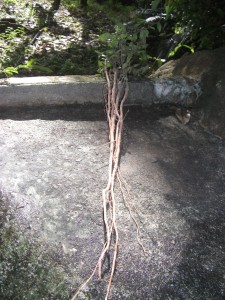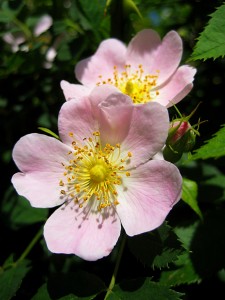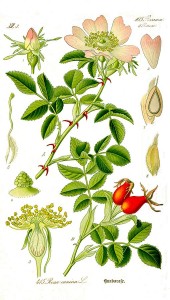Thorns and Roses
There’s a nasty development in the jungle garden. Tiny dark shrubs with hideously sharp thorns are springing up all over. They are savaging my ankles, and have been very hard to uproot, until now.
With monsoon and the deep drenching of everything, plus the sandy soil factor, and some luck, and I don’t know what else, but my ingenious, anger-fueled tugging and twisting removed some of these rotten little sods, including their shockingly long roots, a metre in some cases and that’s not joking.
But, such smooth roots were no match for these perfect conditions. They slid out unbroken, the result I was hoping for, and didn’t believe in, oh me of little faith. I was out in the rain all afternoon, and must have got twenty.
They will die on the burn pile, once it’s dry again, or they’ll drown first.
There are more. They will die later. This is war.
Prickly wild roses
Today’s thorns pricked a memory. “A thorny old dog rose”, I was once called. That kind of thing could be either an argument-starter or the road straight to foreplay. In this context it worked out for the better.
The name was in honour of one of the loveliest things in my former London garden. I’d never seen anything like it. It was either a huge rose-bush or a middle-sized rose-tree. It was ancient, tough, and viciously thorny. It was much taller than I am, and spewed an extravagance of blossom and fragrance.
From its head sprang a dozen curved branches, forming a massive fountain shape, covered in tiny pink roses. It was a splendid canopy, even if you couldn’t go near its core.
Rosa Canina or Dog Roses
“A prickly wild rose (Rosa canina) native to Europe and naturalized in North America, having fragrant pink or white flowers.” (http://www.thefreedictionary.com/dog+rose)
About the name, Wikipedia had this to say:
“The botanical name is derived from the common names ‘dog rose’ or similar in several European languages, including classical Latin and ancient (Hellenistic period) Greek.
“It is sometimes considered that the word ‘dog’ has a disparaging meaning in this context, indicating ‘worthless’ (by comparison with cultivated garden roses) (Vedel & Lange 1960).
“However it also known that it was used in the eighteenth and nineteenth centuries to treat the bite of rabid dogs, hence the name “dog rose” may result from this..
“Other old folk names include dogberry and witches’ briar.
“The fruits are used to make rose-hip tea, syrup, and marmalade.” (https://en.wikipedia.org/wiki/Rosa_canina)
A rose by any other name would be a dog
So, in my case, this explains how I lost a contest – a silly pet name contest. My then partner won with his entry “my thorny old dog-rose”, which reduced me to great laughter. That’s just genius, isn’t it? Flowery flattery and cheeky insult, perfectly integrated.
One word makes such a difference. A rose by any other name would be a dog. Call her a thorny old dog, and you’ll get no sex tonight. “A thorny old dog-rose” and the right sort of smile, however, could mean extras.
That’s just a little domestic tip, for those who stayed awake to the end of our tale, a tale of thorns and roses.
NOODLE TRAILS: A handful of tales every week, of icky fauna and life in a jungle hut (with some chit-chat) here:
https://www.facebook.com/Noodle-Trails-Eileen-Kay-1560532710838005/
PHOTOS
1. by E Kay
2. “Illustration Rosa canina1″ by Otto Wilhelm Thomé – Prof. Dr. Otto Wilhelm Thomé; Flora von Deutschland, Österreich und der Schweiz – 1885, Gera, Germany – www.biolib.de. Licensed under Public Domain via Commons – https://commons.wikimedia.org/wiki/File:Illustration_Rosa_canina1.jpg#/media/File:Illustration_Rosa_canina1.jpg
3. “Divlja ruza cvijet 270508″ by Roberta F.. Licensed under CC BY-SA 3.0 via Commons – https://commons.wikimedia.org/wiki/File:Divlja_ruza_cvijet_270508.jpg#/media/File:Divlja_ruza_cvijet_270508.jpg




0 comments
No comments yet